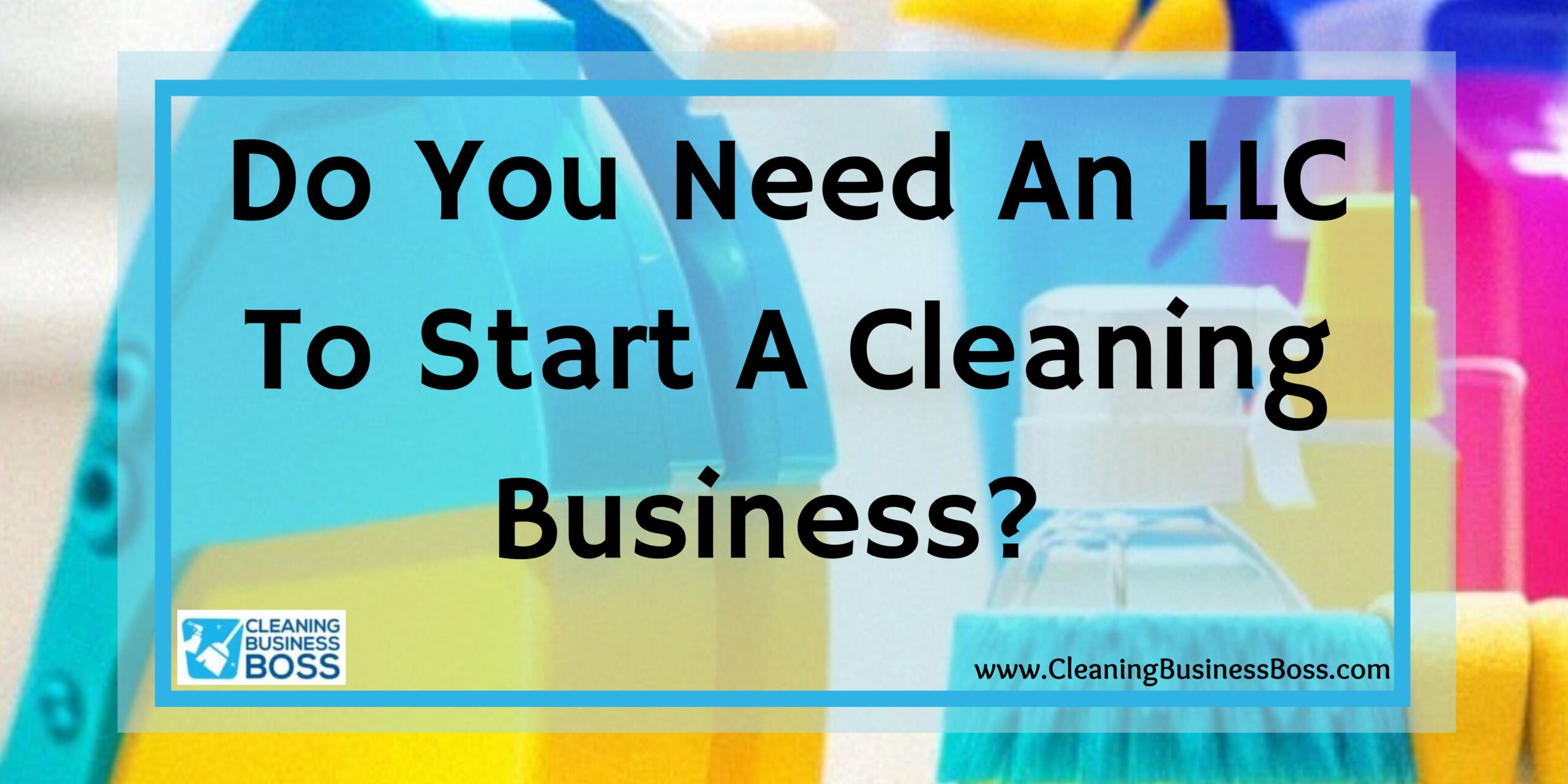Proper setup of a new cleaning business is imperative for its success. Just like a sound business plan, you should complete the decision of the type of structure and the proper filing of paperwork before the company does any business at all.
When beginning a cleaning business, an LLC, or Limited Liability Corporation, is typically the best setup option because it limits your personal liability to the company and has fewer tax requirements. Your Business Registration Options are as follows:
- Sole proprietorship: These types of business setups allow for the most lenient tax requirements but also carry the most personal risk. With a sole proprietorship, you are personally responsible for any liabilities incurred by the company. This means if something goes wrong on a job, you are personally responsible for that debt. If you fail to pay it, you can be sued and possibly lose your personal assets, such as vehicles or even your home.
- Limited Liability Corporation: LLCs offer a fair amount of shielding from personal liability. While you may be responsible for a portion of the debt, an LLC can protect you from losing your personal assets. However, you can be subject to self-employment taxes.
- C-corporation: While a corporation setup offers the most liability protection and access to easier loans, these setups also come with a high cost. Corporations are subject to higher tax rates and also profit taxes.
- S-corporation: This option allows your business to operate without the double taxation of a C-Corporation, and offers liability protection. However, control is shared with shareholders.
- Partnership: Although partnerships offer less financial burden and a more manageable workload, they also come with some hefty requirements. In order for one partner to leave the business, it must be dissolved and restructured. There are also multiple types of partnerships that must be considered.
General Partnership
Each partner has equal decision-making power and liability.
Limited Partnership
One partner has general operating power and carries higher liability, while other partners have limited control and liability.
Limited Liability Partnership
Each partner has equal decision-making power but is protected from other partners’ liabilities.
Why an LLC?

A limited liability corporation provides the most protection available for you as the owner and delivers a lower tax rate than corporations. LLCs are also simple to establish and can be done by simply filing the correct federal and state paperwork.
Maximum Liability Protection
LLCs offer maximum personal protection from the financial obligations of your cleaning business. This means that any debt accrued by your business cannot be collected from your personal assets. Collectors cannot go after your personal property, bank accounts, vehicles, or other assets that are not directly tied to your cleaning business.
Lower Tax Rates
Unlike a Corporation set up, LLCs offer some leniency when it comes to tax requirements. When you establish your cleaning business as an LLC, you aren’t required to pay taxes on profits. Likewise, LLCs offer safety from double taxation as the business owner. Instead of corporate tax filing requirements, LLC owners simply record profits on their personal tax returns, preventing being taxed on the personal side and the business side.
Check out this article to know some ways to thrive your cleaning business.
Simple Dissolution
Limited liability corporations offer comparatively simple methods for legally dissolving your cleaning business, should you decide to close down the road. Many times, it’s a simple matter of filing paperwork and tying up loose ends with debtors and the IRS.
How to Set Up Your LLC

Getting your LLC cleaning business started is fairly simple and can be done in just a few steps. However, if not set up correctly, your business can be fined or even shut down, so it’s important to ensure that it’s done in the right manner.
Choosing a Name
Deciding on a name for your cleaning business may seem like a small thing, but it’s actually a vital step to the success of your business. It’s a good idea to research other cleaning businesses that are nearby to ensure that your name isn’t too similar. Then, to prevent trademark issues in the future, check the availability of your business name with the state.
Choose Your Registered Agent
The next step in your LLC set p is to decide on a registered agent who will be responsible for receiving lawsuits, subpoenas, and other official forms or documents addressed to the business. This can be you as the owner or anyone else over the age of 18.
Filing the Organizational Paperwork
Once you have decided on a name and registered agent, you are ready to file your business’s paperwork with your state. Each state has different requirements for this and provides information on state websites and in-state tax offices. However, the general articles of organization will be required and include:
- The official name of the business
- The address of the business
- The registered agent’s name and address
- The amount of time it’s been in existence if it’s not new
- The nature of the business
Once your cleaning business has been filed with the state, you will receive a certificate of validation. You can then establish a tax ID number and needed bank accounts.
Getting Your Business License
In most counties, you are required to have a license to do business. Typically, general operating licenses are granted by both the city and the state and allow you to legally operate your business within the jurisdiction. These can be acquired at your county office for a fee, which is usually between $25 and $50.
Downfalls Of Forming An LLC
Like any type of business set up, limited liability corporations have their own list of cons. LLCs offer little business power for new businesses, so receiving business loans, credit cards, and other forms of financial padding is exponentially more difficult. Personal taxes may take a hit as well because, as an owner of an LLC, you must typically file as self-employed, meaning that you are personally responsible for any payroll or payment taxes. This may also make personal financial backing more difficult, as the credit and income requirements can often be much more strenuous than typical employment requirements.
Looking for cleaning contracts? Check out this article to know where can you get cleaning contracts.
What An LLC Means For Your Cleaning Business
When you establish your cleaning business as an LLC, you minimize your personal risk. You are not held personally liable if your business goes under with accrued debt, which means that your family and their assets are safe from collection and account freezes. This set up also help your new business be more profitable, with fewer profits spent on taxes. However, while your cleaning business will receive more tax breaks, it will be more challenging to qualify for business loans or charge accounts. It’s also important to remember that an LLC requires taxes to be filed as self-employed, making qualifying for personal loans and accounts more difficult.
How To Convert Your Current Cleaning Business To An LLC

It is fairly simple to convert your current corporation to an LLC. Once you have made the decision to convert to an LLC, you must simply file the paperwork with your state and local offices. This will include filing updated articles of organization for your company as well as amending county and municipal business licenses with your new Employer Identification Number (EIN). You should also be prepared to pay additional taxes for the year of the conversion. The IRS views a corporate to LLC conversion as a sale of the LLC assets. This means you may have to pay taxes on assets you haven’t received money from.
In general, a limited liability corporation is a great way to establish your new cleaning business. With tax breaks, personal liability protection, and minimal cost, it’s a quick, low-risk way to legally operate your company. However, you should be prepared for difficulty acquiring new business loans or lines of credit, as well as personal loans and credit lines. This could mean establishing a larger beginning financial cushion than with other types of business setups. All-in-all, a limited liability corporation is a simple, financially sound way of beginning your business.
Frequently Asked Questions
How much does it cost to start an LLC?
Including the filing fee for the articles of organization, a name reserved, and the business license you will need to operate, starting your LLC could range between $150-300, depending on your state.
How do I dissolve an LLC if I decide to shut down?
Dissolving an LLC is fairly simple and can be completed by filing a dissolution form with the Secretary of State in each state of operation, turning in a final tax return, and discontinuing your business license.
Are there annual costs associated with an LLC?
There is an annual fee for LLC businesses, typically called an annual report or annual certificate. While the fee varies from state to state, you can expect to pay an average of $80-100.
Can I restructure my business from an LLC in the future?
Your LLC can be either modified or restructured by filing the correct paperwork. To restructure your LLC, new articles of organization form must be filed. In order to change the complete structure of your business to a corporation or other type of business setup, you must file a certificate of conversion with the Secretary of State.
To learn more on how to start your own cleaning business, check out my startup documents here.
Please note that the contents of this blog are for informational and entertainment purposes only and should not be construed as legal advice. Any action taken based on the information provided in this blog is solely at your own risk. Additionally, all images used in this blog are generated under the CC0 license of Creative Commons, which means they are free to use for any purpose without attribution.

About the author. Entrepreneur and Cleaning Business Fan.
Hi! I am Shawn and I am a happy individual who happens to be an entrepreneur. I have owned several types of businesses in my life from a coffee shop to an import and export business to an online review business plus a few more and now I create online cleaning business resources for those interested in starting new ventures. It’s demanding work but I love it. I do it for those passionate about their business and their goals. That’s why when I meet a cleaning business owner, I see myself. I know how hard the struggle is to retain clients, find good employees and keep the business growing all while trying to stay competitive.
That’s why I created Cleaning Business Boss: I want to help cleaning business owners like you build a thriving business that brings you endless joy and supports your ideal lifestyle.


